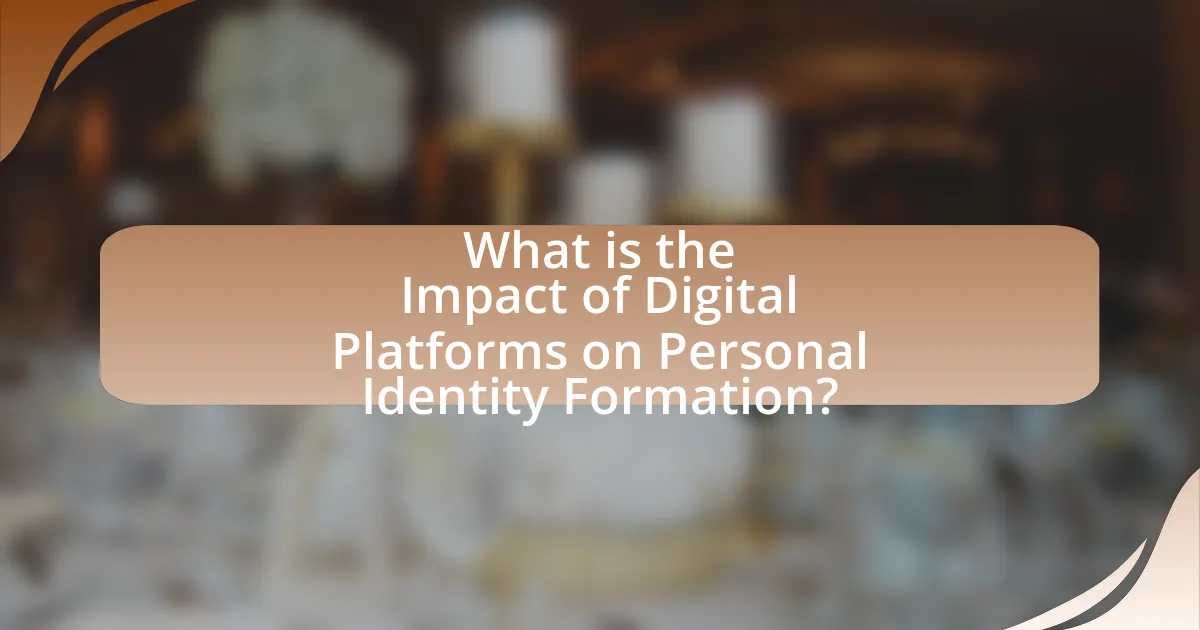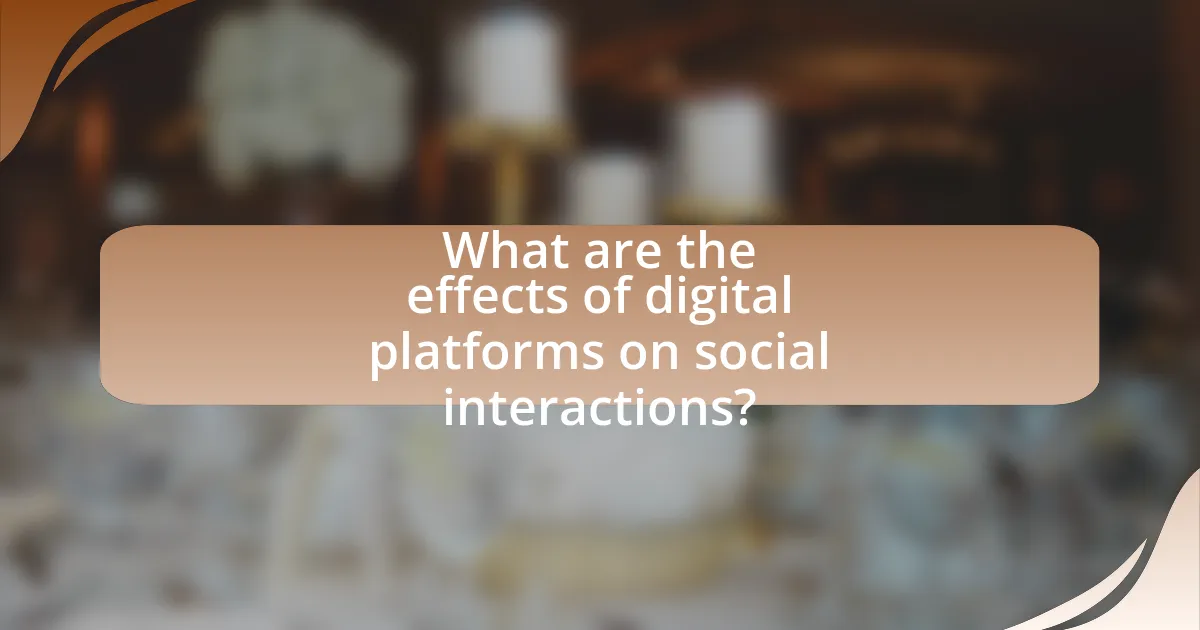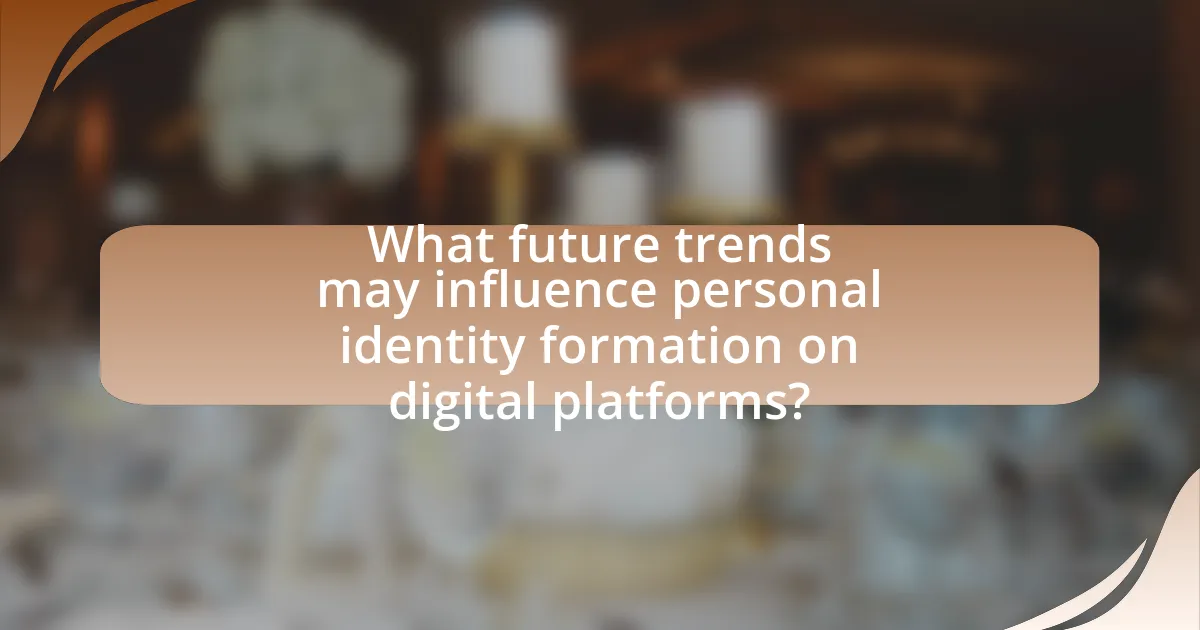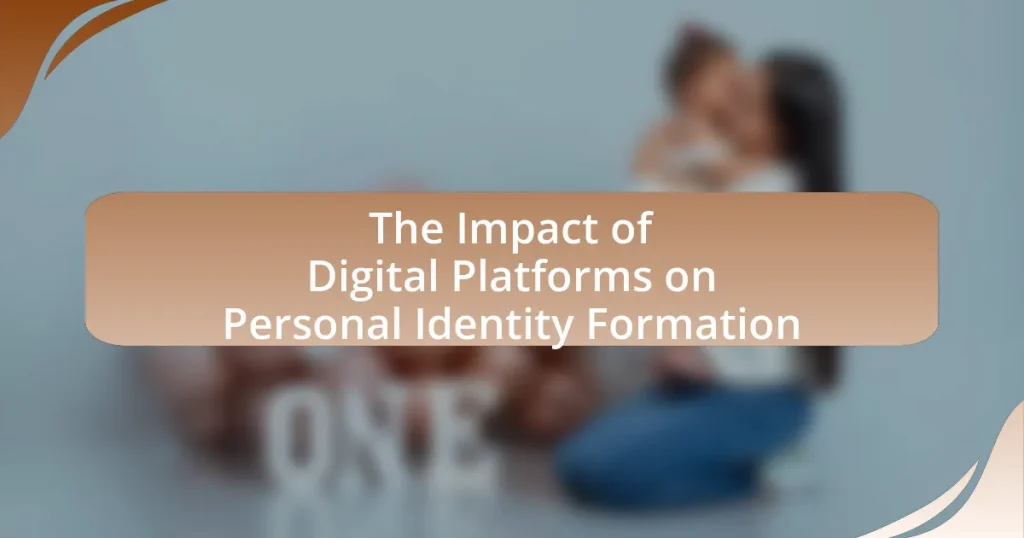The article examines the impact of digital platforms on personal identity formation, highlighting how these platforms facilitate self-expression, social interaction, and community building. It discusses the influence of social media on self-perception, self-esteem, and identity curation through profiles and online interactions. Key topics include the psychological implications of digital identity, the challenges of privacy and identity misrepresentation, and the role of online communities in shaping personal identity. Additionally, the article explores future trends, such as artificial intelligence and virtual reality, that may further influence identity formation in the digital age.

What is the Impact of Digital Platforms on Personal Identity Formation?
Digital platforms significantly influence personal identity formation by providing spaces for self-expression, social interaction, and community building. These platforms enable individuals to curate their identities through profiles, posts, and interactions, allowing for a diverse representation of self. Research indicates that 70% of adolescents report that social media influences their self-image, highlighting the platforms’ role in shaping perceptions of identity. Furthermore, studies show that online interactions can lead to identity exploration, as users engage with various communities that reflect different aspects of their identities, such as gender, ethnicity, and interests. This dynamic interaction between digital engagement and identity development underscores the profound impact of digital platforms on how individuals perceive and construct their identities.
How do digital platforms influence individual self-perception?
Digital platforms significantly influence individual self-perception by shaping how users view themselves through curated content and social interactions. These platforms often promote idealized images and lifestyles, leading individuals to compare themselves against these standards, which can result in altered self-esteem and identity. Research indicates that frequent exposure to social media can correlate with increased feelings of inadequacy and anxiety, as users may feel pressured to conform to perceived norms. For instance, a study published in the journal “Cyberpsychology, Behavior, and Social Networking” found that individuals who engage heavily with social media report lower self-esteem and higher body dissatisfaction. This evidence underscores the profound impact digital platforms have on shaping personal identity and self-worth.
What role do social media profiles play in shaping identity?
Social media profiles play a crucial role in shaping identity by serving as a digital representation of individuals, allowing them to curate and express their personal narratives. These profiles enable users to select and showcase specific aspects of their lives, interests, and values, which can influence how they perceive themselves and how others perceive them. Research indicates that individuals often engage in self-presentation strategies on platforms like Facebook and Instagram, where they highlight achievements and desirable traits, thereby constructing an identity that may differ from their offline selves. This phenomenon is supported by a study published in the journal “Computers in Human Behavior,” which found that users often modify their online personas to align with social expectations and gain social validation, further reinforcing the impact of social media on identity formation.
How does online interaction affect self-esteem and self-image?
Online interaction significantly influences self-esteem and self-image by shaping individuals’ perceptions of themselves based on feedback and comparisons made in digital environments. Research indicates that positive online interactions, such as receiving likes or supportive comments, can enhance self-esteem, while negative experiences, such as cyberbullying or social comparison, can lead to decreased self-worth. A study published in the journal “Cyberpsychology, Behavior, and Social Networking” by Primack et al. (2017) found that higher social media use correlates with increased feelings of inadequacy and lower self-esteem among users. Thus, the nature of online interactions plays a crucial role in determining how individuals view themselves and their worth in relation to others.
Why is personal identity important in the digital age?
Personal identity is crucial in the digital age because it shapes how individuals present themselves online and interact with others. In a landscape dominated by social media and digital communication, personal identity influences reputation, relationships, and opportunities. Research indicates that 70% of employers use social media to screen candidates, highlighting the importance of a curated online identity in professional contexts. Furthermore, personal identity affects mental health; studies show that individuals with a strong sense of identity are more resilient to online harassment and social comparison. Thus, personal identity serves as a foundational element in navigating the complexities of digital interactions and maintaining well-being in an increasingly interconnected world.
How does identity formation differ in online versus offline contexts?
Identity formation differs significantly in online versus offline contexts primarily due to the nature of interaction and self-presentation. In online contexts, individuals often curate their identities through selective sharing and anonymity, allowing for greater experimentation with different personas. This is supported by research indicating that online platforms enable users to present idealized versions of themselves, which can lead to a fragmented identity (Suler, 2004, “The Online Disinhibition Effect”). Conversely, offline identity formation is typically grounded in direct social interactions and physical presence, where feedback is immediate and often more authentic, leading to a more cohesive sense of self. Studies show that face-to-face interactions foster deeper emotional connections and social cues that are less prevalent online (Walther, 1996, “Computer-Mediated Communication”). Thus, while online identity can be fluid and multifaceted, offline identity tends to be more stable and integrated.
What are the psychological implications of digital identity?
Digital identity significantly influences psychological well-being, shaping self-perception, social interactions, and mental health. Individuals often curate their online personas, which can lead to a disconnect between their real and digital selves, resulting in identity confusion and anxiety. Research indicates that excessive engagement with social media can contribute to feelings of inadequacy and depression, as users frequently compare themselves to idealized representations of others. A study published in the journal “Cyberpsychology, Behavior, and Social Networking” found that individuals with a strong reliance on digital identity reported higher levels of social anxiety and lower self-esteem. Thus, the psychological implications of digital identity encompass both the enhancement of social connectivity and the potential for negative mental health outcomes.
What challenges arise from digital identity formation?
Digital identity formation presents several challenges, including privacy concerns, misinformation, and identity theft. Privacy concerns arise as individuals often share personal information on digital platforms, leading to potential misuse by third parties. Misinformation can distort an individual’s online persona, as false information may spread rapidly, impacting reputation and self-perception. Identity theft poses a significant risk, where malicious actors can impersonate individuals, leading to financial and emotional consequences. According to a 2021 report by the Identity Theft Resource Center, there were over 1,800 data breaches in the U.S., exposing millions of personal records, highlighting the prevalence of identity theft in the digital landscape.
How do issues of privacy and security impact personal identity?
Issues of privacy and security significantly impact personal identity by shaping how individuals present themselves and interact online. When users feel their personal information is vulnerable, they may alter their online behavior, opting for anonymity or limiting the information they share. For instance, a study by the Pew Research Center found that 64% of Americans have experienced a major data breach, leading many to adjust their privacy settings and reduce their online presence. This shift can result in a fragmented identity, where individuals curate their online personas to protect their privacy, ultimately affecting their authenticity and social interactions.
What are the risks of identity misrepresentation online?
Identity misrepresentation online poses significant risks, including fraud, reputational damage, and psychological harm. Fraud occurs when individuals impersonate others to deceive for financial gain, leading to identity theft, which affects millions annually; for instance, the Federal Trade Commission reported over 1.4 million identity theft complaints in 2020. Reputational damage arises when false identities lead to misinformation or harmful actions attributed to the misrepresented individual, impacting personal and professional relationships. Psychological harm can manifest through feelings of violation and distrust, as victims may experience anxiety and diminished self-esteem due to the misrepresentation. These risks highlight the critical need for vigilance and verification in online interactions.
How do digital platforms facilitate community and belonging?
Digital platforms facilitate community and belonging by providing spaces for individuals to connect, share, and engage with like-minded people. These platforms enable users to form relationships through shared interests, experiences, and values, fostering a sense of belonging. For instance, social media networks like Facebook and Instagram allow users to join groups and participate in discussions that resonate with their identities, leading to increased social support and validation. Research indicates that online communities can significantly enhance feelings of connectedness, as evidenced by a study published in the Journal of Computer-Mediated Communication, which found that individuals who engage in online communities report higher levels of social well-being and belonging.
What strategies can individuals use to manage their digital identities?
Individuals can manage their digital identities by regularly reviewing and updating their privacy settings across various platforms. This proactive approach allows individuals to control who can access their personal information and how it is shared. Additionally, individuals should conduct periodic audits of their online presence by searching for their names and assessing the information available about them. This helps identify any inaccuracies or unwanted content that may affect their reputation. Furthermore, using strong, unique passwords and enabling two-factor authentication enhances security, reducing the risk of identity theft. According to a 2021 study by the Pew Research Center, 81% of Americans feel they have little to no control over the data collected about them, highlighting the importance of these strategies in maintaining a positive digital identity.
How can one create a positive online presence?
To create a positive online presence, individuals should consistently share valuable and authentic content that reflects their personal brand and values. Engaging with followers through meaningful interactions, such as responding to comments and participating in discussions, fosters a sense of community and trust. Research indicates that 70% of employers use social media to screen candidates, highlighting the importance of a well-curated online image. Additionally, maintaining a professional tone and being mindful of privacy settings can further enhance one’s reputation online.
What best practices should be followed for maintaining privacy online?
To maintain privacy online, individuals should utilize strong, unique passwords for each account and enable two-factor authentication whenever possible. Strong passwords reduce the risk of unauthorized access, while two-factor authentication adds an additional layer of security, making it significantly harder for attackers to compromise accounts. According to a 2021 study by the Cybersecurity & Infrastructure Security Agency, accounts with two-factor authentication are 99.9% less likely to be hacked. Additionally, users should regularly review privacy settings on social media platforms and limit the amount of personal information shared publicly. This practice minimizes the risk of personal data being exploited. Furthermore, employing a virtual private network (VPN) can help protect internet traffic from eavesdropping, especially on public Wi-Fi networks. The use of VPNs has been shown to enhance online privacy by encrypting data, making it more difficult for third parties to monitor online activities.

What are the effects of digital platforms on social interactions?
Digital platforms significantly alter social interactions by facilitating instant communication and broadening social networks. These platforms enable users to connect with a diverse range of individuals, fostering relationships that may not occur in traditional face-to-face settings. Research indicates that 72% of adults use social media, which enhances connectivity but can also lead to superficial interactions, as evidenced by studies showing that online relationships often lack the depth of in-person connections. Furthermore, digital platforms can contribute to social isolation, with 20% of users reporting feelings of loneliness despite being connected online. This dual effect highlights the complexity of social interactions in the digital age, where increased connectivity can coexist with diminished relational quality.
How do online communities shape personal identity?
Online communities shape personal identity by providing individuals with spaces to express themselves, connect with like-minded people, and receive feedback that influences their self-perception. These platforms facilitate the exploration of various aspects of identity, such as interests, beliefs, and values, allowing users to curate their online personas. Research indicates that participation in online communities can lead to increased self-awareness and affirmation of identity, as individuals often find validation through interactions and shared experiences. For example, a study by the Pew Research Center found that 69% of adults in the U.S. believe that social media helps them connect with others who share their interests, reinforcing their sense of belonging and identity.
What types of online communities exist and how do they influence identity?
Online communities can be categorized into various types, including social networking sites, forums, gaming communities, and interest-based groups, each influencing identity through interaction and shared experiences. Social networking sites like Facebook and Instagram shape identity by allowing users to curate their self-presentation and receive feedback from peers, which can reinforce or alter self-perception. Forums, such as Reddit, facilitate discussions around specific topics, enabling individuals to adopt identities based on shared interests and values. Gaming communities, like those found in multiplayer online games, foster identities tied to in-game roles and teamwork, impacting social skills and self-esteem. Interest-based groups, such as those on platforms like Discord, create a sense of belonging and community, influencing personal identity through collective engagement and support. Research indicates that these interactions can lead to both positive and negative identity formation, as individuals navigate their self-concept in relation to community norms and expectations.
How does participation in these communities affect self-concept?
Participation in online communities significantly enhances self-concept by providing individuals with a sense of belonging and validation. Engaging in these communities allows members to express their identities, share experiences, and receive feedback, which reinforces their self-perception. Research indicates that individuals who actively participate in online groups report higher self-esteem and a more coherent self-identity, as these platforms facilitate social interactions that affirm personal values and beliefs. For instance, a study published in the Journal of Computer-Mediated Communication found that users who engage in supportive online communities experience improved self-concept clarity, demonstrating the positive impact of digital interactions on personal identity formation.
What role does feedback from digital platforms play in identity formation?
Feedback from digital platforms significantly influences identity formation by providing individuals with validation, social comparison, and a sense of belonging. This feedback, often in the form of likes, comments, and shares, shapes how users perceive themselves and their social roles. Research indicates that positive feedback can enhance self-esteem and reinforce personal identity, while negative feedback may lead to identity confusion or anxiety. For instance, a study published in the journal “Computers in Human Behavior” by Kross et al. (2013) found that individuals who received more positive feedback on social media reported higher levels of self-worth and identity affirmation. Thus, the interaction with feedback on digital platforms plays a crucial role in shaping and evolving personal identities in contemporary society.
How do likes, comments, and shares impact self-perception?
Likes, comments, and shares significantly impact self-perception by influencing individuals’ feelings of validation and self-worth. Research indicates that positive engagement on social media can enhance self-esteem, as users often equate the quantity of likes and supportive comments with social approval and personal value. For instance, a study published in the journal “Cyberpsychology, Behavior, and Social Networking” found that individuals who receive more likes report higher levels of self-esteem and life satisfaction. Conversely, negative feedback or a lack of engagement can lead to feelings of inadequacy and lower self-esteem, demonstrating that social media interactions directly shape how individuals view themselves.
What is the significance of validation in online interactions?
Validation in online interactions is significant because it fosters a sense of belonging and self-worth among individuals. When users receive positive feedback, such as likes or comments, it reinforces their identity and encourages further engagement. Research indicates that social validation can enhance emotional well-being, as demonstrated in a study published in the journal “Cyberpsychology, Behavior, and Social Networking,” which found that individuals who receive validation online report higher levels of self-esteem and life satisfaction. This connection between validation and personal identity formation highlights the crucial role digital platforms play in shaping how individuals perceive themselves and their social standing.
How do digital platforms affect cultural identity?
Digital platforms significantly influence cultural identity by facilitating the exchange and blending of diverse cultural expressions. These platforms enable users to access, share, and interact with a wide range of cultural content, leading to the emergence of hybrid identities. For instance, social media platforms like Instagram and TikTok allow individuals to showcase their cultural backgrounds while simultaneously adopting elements from other cultures, resulting in a more fluid and dynamic sense of identity. Research indicates that 70% of young people report that social media has helped them connect with their cultural heritage while also exposing them to global cultures, thus reshaping their understanding of identity.
What is the impact of globalization on personal identity through digital platforms?
Globalization significantly influences personal identity through digital platforms by facilitating cross-cultural interactions and exposure to diverse perspectives. This exposure allows individuals to construct their identities by integrating elements from various cultures, leading to a more fluid and hybrid sense of self. For instance, a study by the Pew Research Center found that 72% of social media users engage with content from different cultures, which shapes their views and self-perception. Consequently, digital platforms serve as arenas for identity exploration and expression, enabling users to navigate and negotiate their personal identities in a globalized context.
How do digital platforms facilitate cultural exchange and identity exploration?
Digital platforms facilitate cultural exchange and identity exploration by providing accessible spaces for diverse interactions and content sharing. These platforms, such as social media, forums, and streaming services, enable users to connect with individuals from various cultural backgrounds, fostering dialogue and understanding. For instance, platforms like Instagram and TikTok allow users to share cultural practices, traditions, and personal stories, which can lead to greater awareness and appreciation of different identities. Research indicates that 72% of users feel more connected to cultures outside their own through social media interactions, highlighting the role of these platforms in bridging cultural gaps and promoting identity exploration.

What future trends may influence personal identity formation on digital platforms?
Future trends that may influence personal identity formation on digital platforms include the rise of artificial intelligence, increased personalization through data analytics, and the growing importance of virtual and augmented reality. Artificial intelligence is shaping how individuals curate their online personas by providing tailored content and interactions, which can reinforce or alter self-perception. Increased personalization, driven by data analytics, allows platforms to create unique user experiences that can significantly impact how individuals express their identities. Additionally, the integration of virtual and augmented reality is transforming social interactions, enabling users to explore and present their identities in immersive environments. These trends collectively reshape the dynamics of identity formation by influencing how individuals engage with digital spaces and perceive themselves within them.
How might emerging technologies reshape identity formation?
Emerging technologies significantly reshape identity formation by enabling individuals to curate and express their identities through digital platforms. These platforms, such as social media and virtual reality, allow users to present selective aspects of themselves, influencing how they perceive their identities and how others perceive them. For instance, research indicates that social media usage can lead to identity exploration and experimentation, particularly among adolescents, as they navigate different roles and self-representations online. This dynamic interaction between technology and identity formation is supported by studies showing that online interactions can reinforce or challenge existing identities, ultimately leading to a more fluid and multifaceted sense of self.
What role will virtual reality and augmented reality play in identity exploration?
Virtual reality (VR) and augmented reality (AR) will significantly enhance identity exploration by providing immersive environments that allow individuals to experiment with different aspects of their identity. These technologies enable users to engage in simulated experiences that reflect various identities, facilitating self-discovery and personal growth. For instance, studies have shown that VR can create safe spaces for users to explore gender identity, cultural backgrounds, and social roles, leading to increased empathy and understanding of diverse perspectives. Research by Bailenson et al. (2008) in “The Nonverbal Communication of Emotion in Virtual Environments” highlights how immersive experiences can influence self-perception and identity formation, demonstrating the potential of VR and AR as tools for meaningful identity exploration.
How could artificial intelligence impact personal identity online?
Artificial intelligence could significantly impact personal identity online by shaping how individuals present themselves and interact with digital platforms. AI algorithms analyze user behavior, preferences, and interactions, which can lead to tailored content and experiences that influence self-perception and identity formation. For instance, social media platforms utilize AI to curate feeds based on user engagement, potentially reinforcing certain aspects of identity while marginalizing others. Research indicates that 64% of users feel that social media influences their self-image, highlighting the role of AI in shaping perceptions of identity.
What are the implications of evolving digital platforms for personal identity?
Evolving digital platforms significantly impact personal identity by shaping how individuals present themselves and interact with others online. These platforms facilitate the construction of multiple identities, allowing users to curate their online personas through selective sharing of information, which can lead to fragmented self-representation. Research indicates that 70% of young adults report feeling pressure to portray an idealized version of themselves on social media, highlighting the influence of digital environments on self-perception and identity formation. Furthermore, the algorithms that govern these platforms often reinforce existing identities by promoting content that aligns with users’ previous interactions, thereby limiting exposure to diverse perspectives and potentially leading to echo chambers. This dynamic can affect personal identity by constraining the development of a multifaceted self, as individuals may feel compelled to conform to the norms and expectations set by their digital communities.
How can individuals adapt to changes in digital identity norms?
Individuals can adapt to changes in digital identity norms by actively managing their online presence and privacy settings. This involves regularly updating personal information, being mindful of the content they share, and understanding the implications of their digital footprint. Research indicates that 70% of employers use social media to screen candidates, highlighting the importance of a curated digital identity. By engaging in digital literacy education, individuals can better navigate evolving norms and protect their personal information, ensuring they align their online persona with their values and goals.
What skills are necessary for navigating future digital identities?
The skills necessary for navigating future digital identities include digital literacy, critical thinking, and cybersecurity awareness. Digital literacy enables individuals to effectively use technology and understand online platforms, which is essential as digital identities become increasingly complex. Critical thinking allows users to evaluate the credibility of information and discern between authentic and misleading content, a crucial skill in an era of misinformation. Cybersecurity awareness is vital for protecting personal data and understanding privacy settings, as breaches can significantly impact one’s digital identity. These skills collectively empower individuals to manage their online presence responsibly and securely.
What practical tips can help individuals navigate their digital identities effectively?
To navigate digital identities effectively, individuals should regularly audit their online presence by reviewing privacy settings and the information shared across platforms. This practice helps in understanding what personal data is publicly accessible and allows for adjustments to enhance privacy. Research indicates that 70% of users are unaware of their digital footprints, highlighting the importance of proactive management. Additionally, individuals should create strong, unique passwords and enable two-factor authentication to protect their accounts from unauthorized access. According to a 2021 study by the Cybersecurity & Infrastructure Security Agency, using multi-factor authentication can reduce the risk of account compromise by 99.9%. Lastly, individuals should be mindful of the content they post, as it can shape their digital identity and affect personal and professional opportunities.










